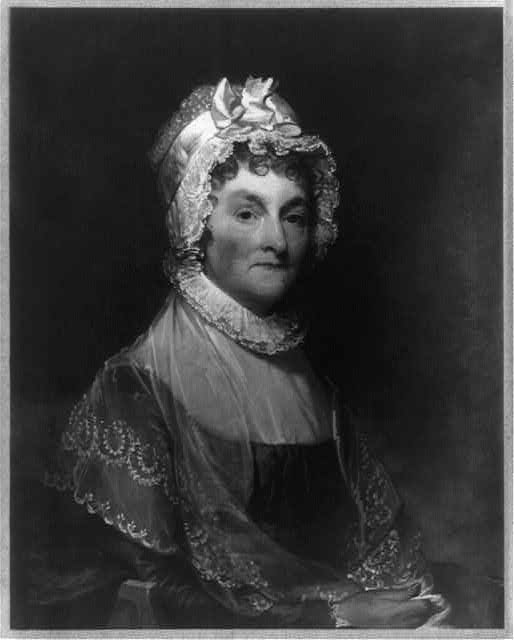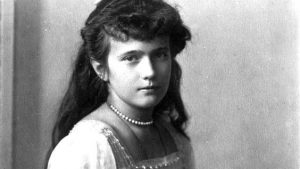Too often in society women are belittled because of their gender, despite their numerous abilities and achievements. Women all over the world fall victims, and struggle to become survivors, of inequality against their male counterparts. Although some improvements have been made over time, there is still much progress to be done in order to establish an equality between men and women in all aspects of life, not just in a few token areas. During the eighteenth century, a few women became advocates for women’s rights and fought for individual freedoms that were attainable for men but rarely for women. One of these advocates was Abigail Adams, first lady to the second President, John Adams. Abigail, a devout wife and American citizen, was more than just a first lady to the president. She was an early feminist voice who refused to stand by and allow women to be suppressed of their capabilities and their rights.
In order to comprehend why Abigail felt so strongly and fought so vigorously for her beliefs, it is important first to understand how her beliefs became rooted. Abigail was the second out of four children from William Smith and Elizabeth Quincy. Her father was a minister of North Parish Congregational Church of Weymouth in Massachusetts colony; her mother Elizabeth was a typical housewife and mother. Abigail was fortunate enough to be born into such an eminent family in New England with a prosperous lineage of statesman, ministers, and merchants. She was raised in a household that wholeheartedly affirmed the beliefs of rational Puritanism, a solid Christian faith, and a strong education.1

From an early age, Abigail was introduced to the limitations of women by being unable to attend school. Growing up in the eighteenth century, education was highly sought after; however, education was primarily for boys, not girls. Boys had the opportunity to study various subjects, such as Latin, math, French, literature, and Greek. Elite families often prepared their boys to receive a higher education, either at Harvard College or abroad. Since girls were not permitted to attend school, Abigail was educated at home. Though her education did include some rudimentary training in academic areas such as reading and writing, most of her education focused on becoming a traditional housewife and mother. She observed her mother in common domestic skills such as sewing, cooking, and home maintenance.2
Her most significant influence occurred around the time of the Revolutionary War, which was a time of extreme stress and chaos for the young republic. This was a time when participation of every American became absolutely imperative in order to win not only the war, but also to restructure the country afterwards. Despite the circumstances, the social conditions for women went largely unchanged. During the Revolutionary War, while many of the men were away serving the war effort, the women were left in charge of the businesses and farms. The towns and cities were left with impoverished women who were often driven to lead protests and riots against price increases, as well as resorting to looting for food. In other parts of the country, women began to fight back against British troops, whom they were forced to quarter during the war. Some women either by choice, force, or desperation, traveled to the Patriot army camps to live with their male relatives.3
After the women began migrating to the camps, many men became hostile and voiced brutal complaints against the women. One man even expressed a barbarous comment about women, claiming “their falling, their brows beady with the heat, their belongings, slung over one shoulder, chattering and yelling in sluttish shrills as they went.”4 George Washington himself even believed the females to be disruptive and a distraction to the troops. In reality, women were actually a great asset and made major contributions towards the war effort. Most women performed domestic duties such as cooking, laundry, nursing, and even boosting the morale of the soldiers. Some women went beyond the normal expectations and became involved in the combat.5
By the end of the war, the views and standards of women had remained the same as at the outset. Many women began to question their place in society, including Abigail Adams. As early as March 31, 1776, while her husband was in Philadelphia forming a new government, Abigail wrote a letter to her husband, John, imploring him to expand women’s rights to become equal with the rights of men:
I long to hear that you have declared an independancy—and by the way in the new Code of Laws which I suppose it will be necessary for you to make I desire you would Remember the Ladies, and be more generous and favourable to them than your ancestors. Do not put such unlimited power into the hands of the Husbands. Remember all Men would be tyrants if they could. If perticuliar care and attention is not paid to the Laidies we are determined to foment a Rebelion, and will not hold ourselves bound by any Laws in which we have no voice, or Representation.6
Abigail was making her purpose clear and made sure it was known that women would no longer stand for unfair and unjust treatment.

Abigail continued to fight for the rights of women for the rest of her life. Although she was most known for her strong tone in her letters, she was also a major advocate for the right of education for women. Abigail became one of the most literate and politically-powerful women of her time.7 Her ideals, courage to voice her intellectual opinions, and ability to stand up for her beliefs is what established the main attraction between her and John. Abigail was able to maintain the perfect image of the domestic housewife, mother, and First Lady to the President of the United States. Abigail tread a path for women which is still being followed today. Hopefully her beliefs and visions for the equality of women will one day come true.
- Salem Press Biographical Encyclopedia, 2016, s.v. “Abigail Adams” by Mary E. Virginia. ↵
- Salem Press Biographical Encyclopedia, 2016, s.v. “Abigail Adams” by Mary E. Virginia. ↵
- Alan Brinkley, American History: Connecting with the Past Volume 1, 15 edition (New York: McGraw-Hill Education, 2015), 147. ↵
- Brinkley, American History: Connecting with the Past, 147. ↵
- Brinkley, American History: Connecting with the Past, 147. ↵
- Abigail Adams, “Abigail Adams’ Letters to John Adams March 31, 1776,” Adams Family Papers: An Electronic Archive. Massachusetts Historical Society. http://www.masshist.org/digitaladams/. ↵
- Salem Press Biographical Encyclopedia, 2016, s.v. “Abigail Adams” by Mary E. Virginia. ↵



85 comments
Eugenio Gonzalez
The author first tells us how Abigail Adams was and how she was an advocate for feminism. Before becoming the second lady, we learn about Abigail’s early with her brothers and parents. Unfortunately, society back then did not permit girls to have an academic education; instead, they were educated by their mothers at home. Abigail would also be educated at home by her mother. During the Revolution war, women, for various reasons, decided to be at the patriot camp with their partners. Many, including George Washington, believed that having women at the camp was negative. After the war, Abigail Adams would sent a letter to his husband, John Adams, asking for women’s rights. Abigail Adams would continue to advocate for women’s rights for the rest of her life. Also, Abigail Adams would become a politically powerful woman and one of the most literate women of her time.
The article’s topic would have occurred during and after the American revolution. I believe this topic happened during the American revolution because it talks about quartering British soldiers and how John Adams was in Philadelphia trying to figure out a government system. The reading can be associated with the class when we talked about the Philadelphia convention and how the founding fathers and others were trying to figure out a proper government system for the U.S.
The article has a compelling narrative that makes the reader more interested and keeps you reading to find out if Abigail Adams achieved her vision for women’s rights. I think it is crucial for the author to write about Abigail Adams because it helps learn another facet of Abigail Adams other than being the First Lady. The author does an excellent job of using qualities images that provides us with the original letter sent to John Adams written by Abigail Adams.
Jackie Velasquez
This was a very informative article and I look up to Abigail Adams as she forced her voice to be heard. She gave an ultimatum that they would rebel which was astonishing. I was bummed to hear that their views of women didn’t change after the war, but they kept fighting for their rights. As much as women did for the men, it was crazy to think that the men would not hear them out for their rights and would just see them as only housewives. Abigail Adams was a very courageous woman and this article did a very good job at portraying that.
Rodney Jones
This article was excellent and gave impeccable information about how Abigail Adams was one of the best women’s rights influencers, I didn’t know that Abigail Adams was putting her life in danger though I thought it would just be ignored like all the other women she could’ve been called a witch and been killed. I love how Abigail Adams put in great detail how women felt degraded and felt how they didn’t serve a purpose and wanted to be involved.
Victoria Cantu
Very impactful and informative article! Abigail Adam’s “Remember the Ladies” letter was probably a very controversial and even a difficult topic to speak about. The fact that she sent this to her husband and stood up for women’s rights knowing the danger, is inspiring. From the writings of the article, I can conclude that Adams was driven to make a difference by representing women and how they felt being degraded solely because of their sex, which she succeeded in. Overall, excellent article! The story was captivating and enlightening!
Helena Griffith
I learned a lot from this article. I was aware of Abigail Adams’ significance to the feminist movement, but until now, I didn’t know how her views on women’s rights evolved from those of a submissive housewife. It’s incredible that men, who did so much for the women, were so opposed to their presence in the camps. It emphasizes how women were mistreated and abused during this period.
Rigel
Wow! I have never heard about Abigail Adams before, which is sad considering she is married to John Adams. The pictures you used for the article make the narrative come to life, especially Abigail’s letter to John Adams. It is informative and sad what the women’s role was in the revolutionary war and how they were treated after it ended.
Dylan Vargas
I like how it started with the induction of Abigail Adams and who she was. Then stated where she came from, what her background was, and what she is going to do to change women’s rights. Telling us how she used her husband John Adams to try to get changes done. Also tell us what the letter she sent meant, how women are tired of the way things are and how they want a change in the way that education goes towards women. Explaining the impact she had, is very informative on the small things like this topic that really go a long way.
Jace Nicolet
This story tells us about how women have been overlooked and underappreciated at the time. From simple everyday things like learning how to drive or how to get a good job was not what people would consider right. It also talks about how women have their own roles in the community but those roles do not live up to the caliber as the roles guys play.
This story is taking place right around the revolutionary war and that is related to what we are learning in class by the time period and also how we talk about roles and jobs in class. We are also learning about the relationship of the colonies and England which is also covered in the passage.
Overall, I believe this is a very well written article. It was very interesting to read and had my attention the whole time. I like how this article highlights the events and the situation some were put in that we don’t hear about all the time and is somewhat new to the reader. It is also interesting to compare the way women were treated back then vs how they are treated nowadays and see the distance we have come.
Vanessa Fabila-Ramirez
This is such an inspiring article to read. I love hearing about women rights. I’m happy I got to learn about Abigail Adams. She really went above to help people and advocate. She learn to read and write because of her mother, who wanted her to. She wrote a really good letter. When the women traveled to where their husbands were, they didn’t just sit there and do nothing. They helped. They clean, serve and went beyond that they helped fight in the war. They shouldn’t forget about them.
Alia Hernandez Daraiseh
This article was very inspirational and informative. This really shows how much Abigail Adams did, rather than what the men did. She was an extreme feminist, and I did not know that she had changed her views, and that she had different views prior to changing to a feminist. It’s interesting to see how her life panned out, and how truly helpful she was to women during the revolutionary war.